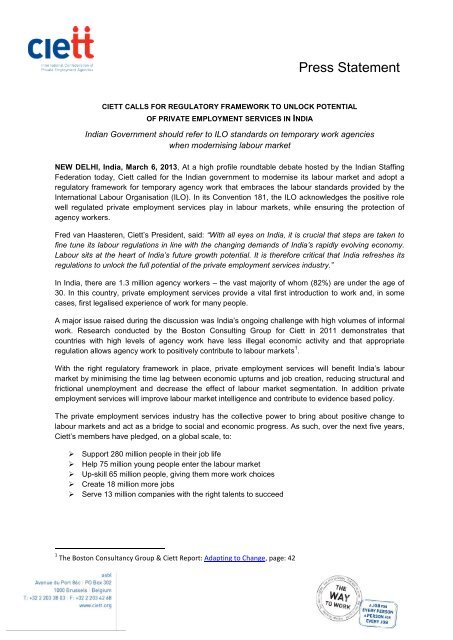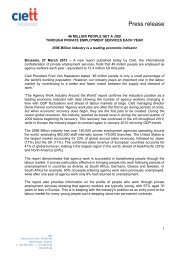Ciett calls for regulatory framework to unlock potential of private ...
Ciett calls for regulatory framework to unlock potential of private ...
Ciett calls for regulatory framework to unlock potential of private ...
Create successful ePaper yourself
Turn your PDF publications into a flip-book with our unique Google optimized e-Paper software.
Press Statement<br />
CIETT CALLS FOR REGULATORY FRAMEWORK TO UNLOCK POTENTIAL<br />
OF PRIVATE EMPLOYMENT SERVICES IN INDIA<br />
Indian Government should refer <strong>to</strong> ILO standards on temporary work agencies<br />
when modernising labour market<br />
NEW DELHI, India, March 6, 2013, At a high pr<strong>of</strong>ile roundtable debate hosted by the Indian Staffing<br />
Federation <strong>to</strong>day, <strong>Ciett</strong> called <strong>for</strong> the Indian government <strong>to</strong> modernise its labour market and adopt a<br />
<strong>regula<strong>to</strong>ry</strong> <strong>framework</strong> <strong>for</strong> temporary agency work that embraces the labour standards provided by the<br />
International Labour Organisation (ILO). In its Convention 181, the ILO acknowledges the positive role<br />
well regulated <strong>private</strong> employment services play in labour markets, while ensuring the protection <strong>of</strong><br />
agency workers.<br />
Fred van Haasteren, <strong>Ciett</strong>’s President, said: “With all eyes on India, it is crucial that steps are taken <strong>to</strong><br />
fine tune its labour regulations in line with the changing demands <strong>of</strong> India’s rapidly evolving economy.<br />
Labour sits at the heart <strong>of</strong> India’s future growth <strong>potential</strong>. It is there<strong>for</strong>e critical that India refreshes its<br />
regulations <strong>to</strong> <strong>unlock</strong> the full <strong>potential</strong> <strong>of</strong> the <strong>private</strong> employment services industry.”<br />
In India, there are 1.3 million agency workers – the vast majority <strong>of</strong> whom (82%) are under the age <strong>of</strong><br />
30. In this country, <strong>private</strong> employment services provide a vital first introduction <strong>to</strong> work and, in some<br />
cases, first legalised experience <strong>of</strong> work <strong>for</strong> many people.<br />
A major issue raised during the discussion was India’s ongoing challenge with high volumes <strong>of</strong> in<strong>for</strong>mal<br />
work. Research conducted by the Bos<strong>to</strong>n Consulting Group <strong>for</strong> <strong>Ciett</strong> in 2011 demonstrates that<br />
countries with high levels <strong>of</strong> agency work have less illegal economic activity and that appropriate<br />
regulation allows agency work <strong>to</strong> positively contribute <strong>to</strong> labour markets 1 .<br />
With the right <strong>regula<strong>to</strong>ry</strong> <strong>framework</strong> in place, <strong>private</strong> employment services will benefit India’s labour<br />
market by minimising the time lag between economic upturns and job creation, reducing structural and<br />
frictional unemployment and decrease the effect <strong>of</strong> labour market segmentation. In addition <strong>private</strong><br />
employment services will improve labour market intelligence and contribute <strong>to</strong> evidence based policy.<br />
The <strong>private</strong> employment services industry has the collective power <strong>to</strong> bring about positive change <strong>to</strong><br />
labour markets and act as a bridge <strong>to</strong> social and economic progress. As such, over the next five years,<br />
<strong>Ciett</strong>’s members have pledged, on a global scale, <strong>to</strong>:<br />
‣ Support 280 million people in their job life<br />
‣ Help 75 million young people enter the labour market<br />
‣ Up-skill 65 million people, giving them more work choices<br />
‣ Create 18 million more jobs<br />
‣ Serve 13 million companies with the right talents <strong>to</strong> succeed<br />
1 The Bos<strong>to</strong>n Consultancy Group & <strong>Ciett</strong> Report: Adapting <strong>to</strong> Change, page: 42
Press Statement<br />
Also speaking at the roundtable event, Ms. Rituparna Chakraborty, Vice President, Indian Staffing<br />
Federation, said: “If the Indian government creates an inclusive and conducive <strong>regula<strong>to</strong>ry</strong> <strong>framework</strong> as<br />
prescribed in the ILO Convention 181, <strong>private</strong> employment agencies or staffing companies as they are<br />
known in India, will assist India’s humongous labor market transition from the in<strong>for</strong>mal <strong>to</strong> the <strong>for</strong>mal<br />
sec<strong>to</strong>r, by providing the youth <strong>of</strong> India a plat<strong>for</strong>m that enables them <strong>to</strong> become more employable and<br />
secure a job that is not only fair but a decent one. The Indian Staffing Federation, with support from<br />
best practices prevalent in other CIETT member countries around the world, will leverage the same <strong>to</strong><br />
ensure that the proportion <strong>of</strong> jobs in the <strong>for</strong>mal sec<strong>to</strong>r in India increases, including contractual and<br />
<strong>private</strong> employment agency services.”<br />
The multi-stakeholder roundtable dialogue <strong>to</strong>ok place in New Delhi, with representatives from the <strong>Ciett</strong><br />
Board, Indian staffing industry, Trade Union, Trade bodies and the Indian Government.<br />
###<br />
For more in<strong>for</strong>mation regarding this debate, please contact:<br />
Denis Pennel, Managing Direc<strong>to</strong>r, <strong>Ciett</strong>:<br />
Email: Denis.Pennel@ciett.org<br />
Phone: +32 475.867.510<br />
Notes <strong>to</strong> Edi<strong>to</strong>rs<br />
About <strong>Ciett</strong><br />
<strong>Ciett</strong> is the authoritative organisation representing the interests <strong>of</strong> the reputable <strong>private</strong> employment agencies<br />
across the world. Recognised as such by international organisations (e.g. EU institutions, International Labour<br />
Organisation, OECD, World Bank), <strong>Ciett</strong> represents the industry at large with 9 <strong>of</strong> the world’s largest staffing<br />
companies as well as 47 national federations from all over the world.<br />
<strong>Ciett</strong> operations are organised across the globe through regional entities. For instance, Eurociett represents the<br />
<strong>private</strong> employment services in Europe, Clett&a in South America and Asiaciett in Northern and Southern<br />
Asia/Pacific. Through their network <strong>of</strong> 179,000 branches and their 860,000 permanent employees, <strong>Ciett</strong> members<br />
employ 12.4 million workers (daily full time equivalent) and 46 million on a yearly basis. They deliver services<br />
through the full spectrum <strong>of</strong> human resources, including temporary agency work, recruitment, interim management,<br />
executive search, outplacement and training.<br />
As the voice <strong>of</strong> labour choice, <strong>Ciett</strong> promotes the vital role that <strong>private</strong> employment services play in helping<br />
organisations, economies and individuals facilitate adaptation <strong>to</strong> change, and their capacity <strong>to</strong> increase labour<br />
market participation, reduce unemployment, build better labour markets and deliver decent work. Members <strong>of</strong> <strong>Ciett</strong><br />
refuse <strong>to</strong> compete at the expense <strong>of</strong> workers’ rights and work hand-in-hand with governments and trade unions <strong>to</strong><br />
fight illegal work and social dumping. However, <strong>Ciett</strong> also recognises that inadequate regulation and a small<br />
number <strong>of</strong> disreputable agencies can prevent the industry from fulfilling its <strong>potential</strong>.<br />
About Indian Staffing Federation<br />
Indian Staffing Federation (ISF) was set up by leading staffing companies in India with one common goal - Staffing<br />
India's Growth. Staffing - an established <strong>for</strong>m <strong>of</strong> outsourcing globally - is yet <strong>to</strong> be recognised and adopted as an<br />
effective means <strong>of</strong> running a business in India. The Staffing Industry provides a plat<strong>for</strong>m <strong>for</strong> recognised<br />
employment, work choice, even compensation, annual benefits and health benefits <strong>for</strong> the temporary work<strong>for</strong>ce that
Press Statement<br />
constitutes a sizeable segment <strong>of</strong> India’s <strong>to</strong>tal work<strong>for</strong>ce. The purpose <strong>of</strong> ISF is <strong>to</strong> enhance long-term growth <strong>of</strong> the<br />
staffing industry and <strong>to</strong> ensure its continued ability <strong>to</strong> make positive contributions <strong>to</strong> the economy and society. The<br />
principal focus <strong>of</strong> the Federation's activities shall be <strong>to</strong> strengthen triangular employment relationships, in which the<br />
staffing company is the employer <strong>of</strong> the temporary worker, who works under the supervision <strong>of</strong> the user company.<br />
ISF spokespersons are available <strong>for</strong> interested journalists who require a quote or <strong>to</strong> explore a particular point made<br />
in this statement. Please contact Emilee/Priyanka at 8447987530/40538239 or media@prhub.com











